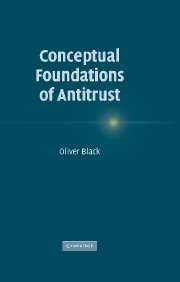1 - What is competition?
Published online by Cambridge University Press: 08 July 2009
Summary
Overview
It is a scandal of antitrust that neither its practitioners nor its theorists agree – in so far as they consider the question at all – on what competition is. Opportunistically, insouciantly or ignorantly, we still lurch among the five definitions that Bork identified decades ago: the process of rivalry; the absence of restraint over one firm's economic activities by another firm; the state of the market in which the individual buyer or seller does not influence the price by his purchases or sales; the existence of fragmented industries and markets; and – Bork's preferred definition – a state of affairs in which consumer welfare cannot be increased by moving to an alternative state of affairs through judicial decree. One response is to say that the plurality of definitions does not matter, because actions promoting or protecting one kind of competition promote or protect all the others. But there is no reason to believe that that is so. Another response is to say that we need different definitions in different contexts – say, cartels and mergers. But that by itself is unsatisfactory, for it fails to identify significant connections between the definitions. We must hope that there are such connections; otherwise antitrust is as incoherent as would be a body of law and policy that concerned banks and covered both financial banks and river banks.
- Type
- Chapter
- Information
- Conceptual Foundations of Antitrust , pp. 6 - 32Publisher: Cambridge University PressPrint publication year: 2005



